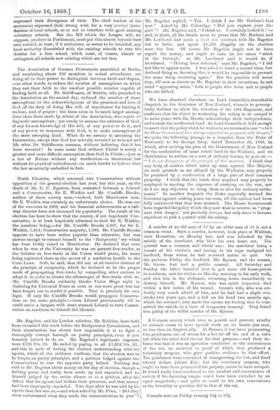North Cheshire, which returned two Conservatives without opposition at the
general election last year, has this year, on the death of Mr. E. C. Egerton, been contested between a Liberal and a Conservative, Sir E. Watkin and Mr. Cunliffe Brooks, neither of them county men,—indeed, both Manchester men. .Sir E. Watkin was certainly an unfortunate choice. He was one of the waverers in 1868, and his financial achievements as a rail- way director have not increased his popularity. The result of the election has been to show that the county, if not hopelessly Con- servative, is at least hopelessly reluctant to elect Sir E. Watkin, the numbers being,—for Mr. Cunliffe Brooks 2,897, for Sir E. Watkin, 1,814; Conservative majority, 1,083. Mr. Cunliffe Brooks appears to have been rather popular than otherwise, but was unwise enough to commit himself to the ' Reciprocity' cry which has been feebly raised in Manchester. He declared that even when he was at the University he was an sarnest free-trader, as the debates on free-trade at the Union would prove, his name being registered there as the mover of a resolution hostile to the Corn Laws. Still, he said, that did not at all involve distrust of the principle of reciprocity, which he declared to be the proper mode of propagating free-trade, by compelling other nations to adopt it in order to obtain the advantages of free-trade with us. Mr. Cunliffe Brooks evidently thinks Victor Hugo right in declaring for Universal Peace as soon as one more great war has been fought out to render it possible. That is precisely his own logic. If only'Mr. Cunliffe Brooks would propagate Conserva- tism on the same principle !—turn Liberal provisionally till he could make a bargain with some staunch Liberal to turn Conser- vative on condition he himself did likewise.






























 Previous page
Previous page